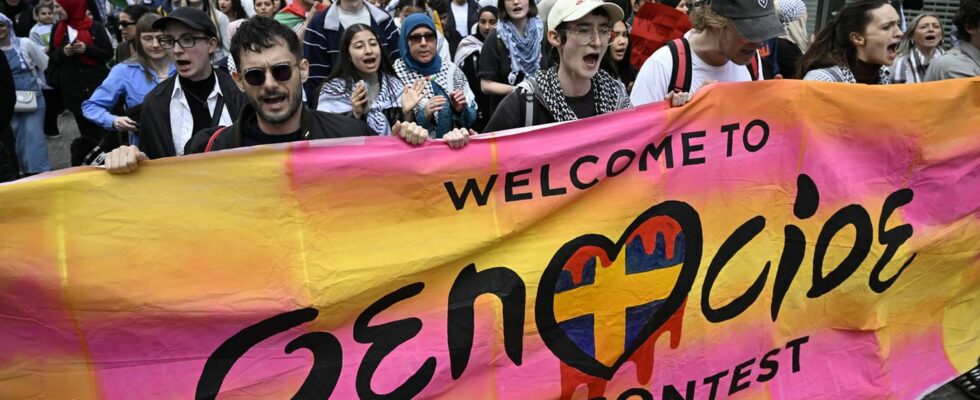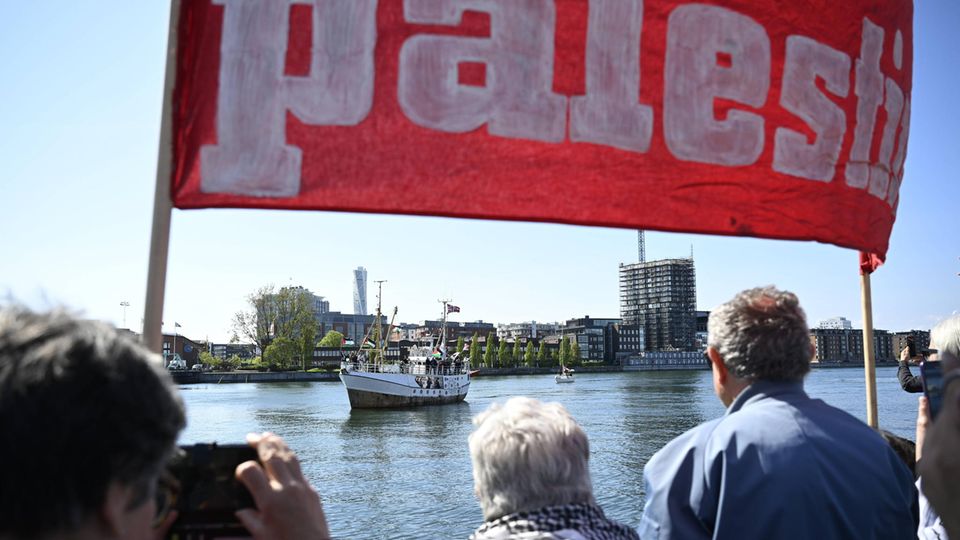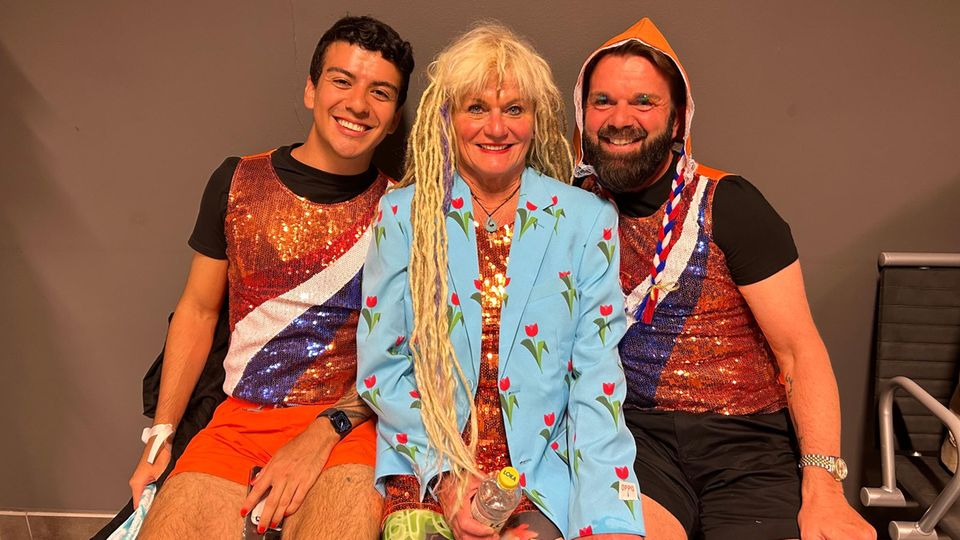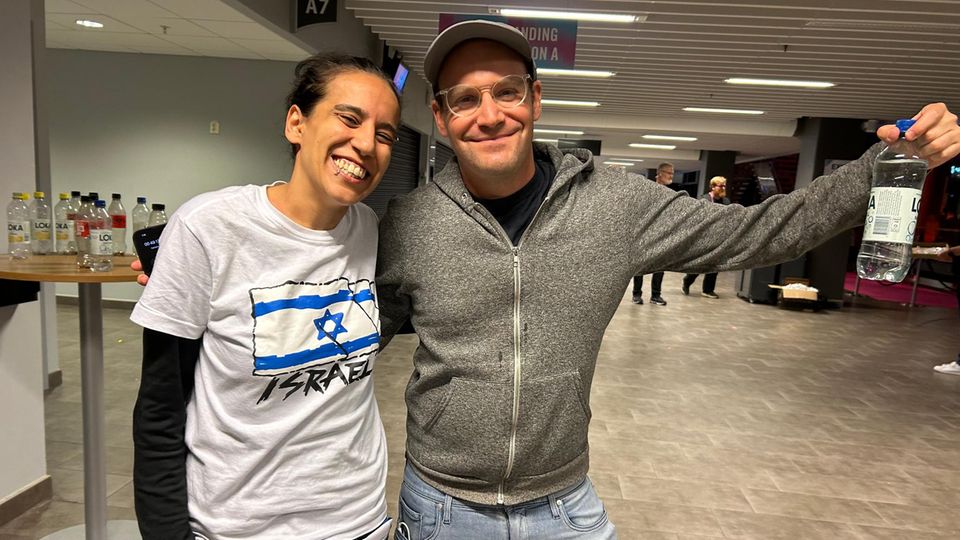On site at this year’s highly politically charged ESC, where fans from Israel and other countries negotiated the future of the competition. With boos and cheers.
On the evening of the Eurovision final, the Malmö Arena was probably the only place in the entire city without a Palestine flag. At least from the inside. On the streets around it in Sweden’s third largest city, a completely different picture emerged: black-wide-red-green as far as the eye could see, slogans against Israel, police officers escorting activist Greta Thunberg away. And then the demonstrators shouted after the ESC fans dressed in glitter: “Shame on you”. It’s unclear why exactly – the outfits on the verge of taste madness or the fact that the ESC was not boycotted despite Israel’s participation.
So the fans pushed through the crowd wrapped in Palestinian cloth, rhinestones between stress makers, and reached their little island of bliss, the arena. Greek flags next to German, Armenian next to Israeli. “I love your song,” some shouted after the others, “I’m voting for you.”
But the strained “acting as if nothing was happening” began to crumble faster than expected. Right at the beginning there was a somewhat too quick mention that the ESC was created for reasons of peace, not against one another. A kindergarten teacher couldn’t have expressed the mantra more beautifully, and probably not more often.
And then they danced across the stage one after the other: the perfectly styled singers. The emphasis was on the “:”. Finally, spoiler alert, it was the non-binary person from Switzerland, i.e. neither clearly male nor female, who achieved victory at the end of the evening: Nemo with the song “The Code”. Among the favorites from the start, celebrated by fans, but wait, wait, that wasn’t the reason why the crowd lost their composure when the envoys arrived.
Rather, it was Israeli singer Eden Golan, dressed in white, who suddenly made the crowd loud. Whistles rang out through the hall – followed by applause and cheers, a desperate attempt to drown out the disruptors. The first and most successful attempt of the evening.
This showed right from the start: Even among ESC fans there are those who don’t care about the apolitical nature of the competition in times of the Gaza war. And those who say: No matter what happens, we want – “a little bit of peace,” to quote the first German ESC winner Nicole. These two groups fought against each other on the final evening. They fought for the basic idea of the ESC, even its raison d’être as a peace festival, and all of this by booing against cheers. In the end, it can be said that it wasn’t the fans in the arena who decided the race. But no one suspected that at the time.
Israel whistles at every mention in the hall
Eden Golan, 20, emphatically diplomatic, was whistled at as he entered, as he had done in rehearsals and the semi-finals. She still proudly held the blue and white flag with the Star of David aloft, as if the audience didn’t even hear her.
But at some point even she could no longer ignore the screaming and whistling. Every time Israel was mentioned, some of the audience would start talking.
When Golan performed her song, you almost didn’t dare to look at her – the thought was so obvious that an audience member would storm the stage.
Golan had already received death threats in advance and thousands demonstrated in front of her hotel room.
Golan sang the final bars in the local language, Hebrew. Once tempers had calmed down again, the crowd started whistling even louder.
Golan calmly walked off the stage to her team after the final note. Then she burst into tears.
A new low in Malmö: Even the die-hard ESC fans who had bought final tickets that cost several hundred euros were now booing them. The fans, who had initially tried to drown out the hatred, also became increasingly quiet. If there were a Eurovision song about Golan’s days in the city, it would be called “Sweden vs. Eden.” It continued like this throughout the evening. More whistles, sometimes so loud that you couldn’t understand a word when the Israeli jury was awarding the points.
Then again ESC-typical frenzy of joy and ecstasy. Fire show after fire show, so that even the audience in the upper echelons was sweating. The German candidate Isaak also stood next to a kind of burning oil barrel while background singers sang “Run, na na eh”. In the lyrics of the song he described himself as “nothing but the average”, which is a maximum improvement for Germany at the ESC. And as if his prophecy had come true, Isaak ended up in midfield, twelfth place. With 99 points, he scored more than all German candidates from the past four years combined. Germany – spoiled with last places – probably wouldn’t have tolerated an even higher ranking, let alone a victory.
ESC 2024: Hiccup between the candidates
The show effects, the exorcism (or exorcism?) of the Irish candidate, the emphasis on the rich ESC history – all of this seemed even more extreme than in previous years. Spectators kept glued to their smartphones, emotionally overwhelmed by Niagara Falls. Finally, the really exciting thing was to be discovered on Instagram – the hiccups between the candidates.
Back in focus: Eden Golan. The Greek candidate yawned ostentatiously during a press conference as Golan spoke and pretended to fall asleep. The Dutch candidate teased Israel in advance – but didn’t even start the finale. And thus became a big topic in the toilet queues at the Malmö Arena. Did Israel have something to do with the disqualification of the crowd favorite? No, it turned out pretty quickly. The fact that the rumor persisted for a long time says a lot about how Israel’s singer was treated as a scapegoat. On social media, Jost Klein is still celebrated as a kind of Eurovision martyr who was kicked out because of his pro-Palestine statements. His pop-techno anthem “Europapa” was declared a protest song.
The actual reason, which his team also confirmed: There was an argument with an employee who was filming him. She reported that she felt threatened by him during the argument. He was disqualified.
Dutch fans who had been looking forward to a song contest in their country were disappointed in the Malmö Arena. So does Harm Slor, glued-on glitter eyelashes, orange-colored palette top. He still celebrated with every song – really every song, he emphasizes. “I’m upset by people who spoil the mood here and boo the young Israeli artist. They destroy the idea of Eurovision, love, family solidarity.” His way of letting out his frustration over Jost Klein being disqualified: “I just didn’t vote for a winning song. I didn’t feel like it anymore.”
The Dutchman Harm Slor (right) is at the ESC for the second time and brought his friends with him. He is disappointed that the Dutch candidate was excluded
© Katharina Kunert
However, enough others voted, triggering the second and third political issues of the evening. First, the state juries. Lots of points for Israel, not a country that wanted to take a biased stance in one direction or the other. Boos as Germany gave Israel eight points.
Many audience votes for Israel
Then the audience votes. While other countries initially scored in the single or double digit range, Israel received: 323. That would have been an enormous number even in times that were not overshadowed by war. But hardly anyone would have expected that people around the world were calling for Israel right now, catapulting the country to number one for just a few minutes. Eden Golan and her team were in each other’s arms, Israeli media wrote that it was the ESC victory of the hearts. A confirmation that you are not alone after all. Joy for Eden Golan, sorrow for the pipers, who must have had very tense lips at the end of the evening.
The two Israelis Adam and Almog were sitting right next to some of them. “These were fans from Ireland who whistled at every mention of Israel,” said Adam. The German fans next door, on the other hand, were “our friends, as it should always be at the ESC.” It was the sixth Eurovision Song Contest for the two of them and they attend rehearsals, semi-finals and finals every year. Your great passion. But this year, Adam says, shortly before leaving Tel Aviv, he considered whether he should cancel everything. Mass protests on Malmö’s streets, agitation against the Israeli singer. But he dared. Albeit with precautions. “We’ve been making up background stories about other countries of origin since we’ve been in Malmö. England, USA. In every café you’re asked where you come from. Here you never know how they would react to the answer ‘Israel’.”
Almog (left) and Adam (right) from Israel didn’t want to let the whistles spoil the mood at the final. In Malmö they did not take to the streets with the Israeli flag for fear of attacks
© Katharina Kunert
Almog wears a T-shirt with “Israel” written on it on the evening of the final. But that would only be possible inside the arena, surrounded by ESC fans. Others also carry their flags through Malmö? Bitter laughter. “We can’t do that, not here, not this year.” But she doesn’t want to get political at all, that’s not why she came to the ESC. Shouts of Palestine come through the glass doors of the arena. Almog puts on a sweater over her Israel T-shirt.





